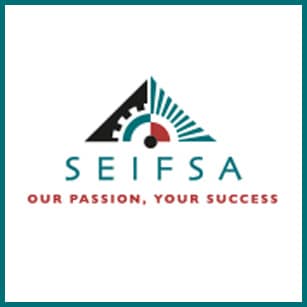Reserve Bank’s Decision To Hike Interest Rates Is Disappointing, Says SEIFSA
Johannesburg, 22 November 2018 – The Steel and Engineering Industries Federation of Southern Africa (SEIFSA) is extremely disappointed over the South African Reserve Bank’s (SARB) decision to hike interest rates by 25 basis points to 6.75 percent, and is concerned that this decision deprives a very weak economy of a much-needed boost.
Speaking after the announcement by the Reserve Bank this afternoon, SEIFSA Economist Marique Kruger said the failure of the SARB’s Monetary Policy Committee to leave interest rates unchanged, at the very least, is disappointing for beleaguered business and over-indebted consumers, especially in the run-up the festive season.
However, Ms Kruger said that given the upside risks that an accommodative monetary policy stance would have on the domestic economy’s inflationary outlook, the decision is understandable. She said it was unfortunate that businesses in the broader domestic economy – and the metals and engineering sector in particular continues to face headwinds, amid increasing operational expenses.
“The generally weaker exchange rate and the higher petrol price impact negatively on the cost of doing business, while increased inflationary pressures caused by an increase in annual consumer price inflation exacerbate the challenging situation,” said Ms Kruger.
She said that given the current state of the economy and the weak domestic demand environment, the decision to increase interest rates will invariably add to the cost of doing business, thereby impacting negatively on the margins of struggling businesses.
SEIFSA is a National Federation representing 23 independent employer. Associations in the metals and engineering industries, with a combined membership of 1600 companies employing around 200 000 employees. The Federation was formed in 1943 and its member companies range from giant steel-making companies to micro-enterprises employing fewer than 50 people.
SEIFSA Concerned About Increase in Inflation Rate
Johannesburg, 21 November 2018 – The increase in the official inflation number released by Statistics South Africa (StatsSA) today does not bode well for hard-pressed businesses in the Metals and Engineering (M&E) cluster, which continue to face headwinds amid low levels of domestic demand, a generally weaker exchange rate and increasing operational expenses, the Steel and Engineering Industries Federation of Southern Africa (SEIFSA) said today.
According to the StatsSA data, the annual Consumer Price Inflation (CPI) increased to 5.1 percent in October 2018, from 4.9 percent in September 2018. The index also registered an increase of 0.5 percent on a month-on-month basis in October 2018.
“An inflationary environment will definitely add to the pressure that local businesses are facing, given its direct impact on consumer demand for goods. Moreover, the generally high petrol price invariably adds to businesses’ logistics costs, and this, in turn, negatively impacts on the cost of doing business. The increase in inflationary pressure is a huge challenge for companies trying to improve on operational efficiency and margins,” SEIFSA Economist Marique Kruger said.
She added that with the official inflation data now trending even closer to the upper band of the South African Reserve inflation target of 3% to 6%, SARB Monetary Policy Committee members find themselves in a difficult position when they meet tomorrow.
“The decision on whether or not to continue with an accommodative monetary policy stance will be a fiercely contested one, given the official mandate of the SARB to contain inflation from galloping away,” said Ms Kruger.
She said that given the current state of the economy, leaving the repo rate unchanged will help in reducing borrowing costs, thereby providing impetus for a rebound in domestic growth.
SEIFSA is a National Federation representing 23 independent employer. Asociations in the metals and engineering industries, with a combined membership of 1600 companies employing around 200 000 employees. The Federation was formed in 1943 and its member companies range from giant steel-making companies to micro-enterprises employing fewer than 50 people.
A third consecutive decrease in broader manufacturing production reflects a generally difficult business environment amid persistently low domestic demand, says SEIFSA
Johannesburg, 8 November 2018 - The Steel and Engineering Industries Federation of Southern Africa (SEIFSA) today laments a third consecutive decrease in output of the broader manufacturing sector – including its diverse metals and engineering (M&E) cluster of industries – for September 2018, underpinned by a difficult operating environment and a worryingly low domestic demand.
Speaking after the release of manufacturing production figures by Statistics South Africa (StatsSA) today, SEIFSA Chief Economist Michael Ade said the manufacturing sector has generally been facing headwinds since the start of the year, characterised by declining business and consumer confidence.
“Although production data in the sector is still positively trending, the data has consistently declined from July 2018. Moreover, corresponding increases in fuel prices, a weaker rand and higher prices of both intermediate and final input have increased operational costs, also depleting existing margins,” said Dr Ade.
He said the output performance in September, which officially closes off quarter three of 2018, is perturbing, especially considering that domestic demand is generally subdued as a result of the economic recession and a volatile exchange rate. He said it was clear from the data that the positive sentiments following the stimulus plan recently outlined by President Cyril Ramaphosa has yet to filter through to the manufacturing sector and the M&E cluster.
“Consequently, the general contribution of the sector to the Gross Domestic Product in quarter three will be lower than expected, especially considering that the benefits from outlined stimulus interventions will only become effective with a lag,” said Dr Ade
The latest preliminary seasonally-adjusted data capture a decrease in production in the broader manufacturing sector in September 2018 when compared with August 2018. On a continuous three-monthly basis, output in the manufacturing sector decreased consecutively from 2,7% in July 2018, to 1,5% in August 2018 and 0,1% in September 2018.
Dr Ade said the poor performance in September 2018 was expected, following the recent release of deteriorating data for the purchasing managers’ index (PMI), which dipped to almost a decade low of 42,4 index points. The composite ABSA manufacturing PMI data for October effectively signalled a fourth successive decrease from July, further trending away from the 50-point benchmark level which separates expansion from contraction in business activity, thus triggering new concerns about the state of the economy.
“SEIFSA encourages businesses to stay resilient in the face of the current adversity characterised by volatile production, high unemployment levels, a trade deficit and subdued domestic demand, as policy makers implement measures to help the economy navigate the trough,” Dr Ade concluded.
Ends
Issued by:
Ollie Madlala
Communications Manager
Tel: (011) 298 9411 / 082 602 1725
Email: ollie@seifsa.co.za
Web: www.seifsa.co.za
Consistent Purchasing Managers’ Index Decline Highlights the Challenges Faced By Manufacturers
Johannesburg, 1 November 2018 - The Steel and Engineering Industries Federation of Southern Africa (SEIFSA) is concerned about the dip in overall business activity in the broader manufacturing sector, as reflected in the Absa Purchasing Managers Index (PMI) released today. Speaking after the release of the Index, SEIFSA Economist Marique Kruger said given that the PMI is an indicator of the economic health of the broader manufacturing sector, of which the metals and engineering (M&E) cluster is part, the data highlight that the sector is still facing significant challenges.
The overall headline PMI data indicate that manufacturing activity in the country declined for a third consecutive month to 42.4 percent in October 2018, from 44.5 percent in September 2018, with the seasonally-adjusted index moving further away from the neutral level of 50, which separates expansion from contraction.
“The consistent decrease in the PMI data highlights the challenging operating environment of business amid prevailing low levels of domestic demand, increasing input costs as a result of a generally weak exchange rate and increasing fuel prices which negatively impact on escalating logistics costs,” said Ms Kruger.
She added that the headline PMI and its five main sub-indices play an important role in businesses’ decision-making processes. The business activity index, which enables manufacturers to gauge production activity and output levels in the sector, remained largely unchanged at 40.3 percent in October 2018. He said the index had performed poorly on a consistent basis since March 2018, and that its poor performance was concerning for manufacturers in the sector, especially given the low domestic demand levels.
“The best performer was the employment sub-index which improved from 43.3 percent in September 2018 to 44.2 percent in October 2018. Given that the employment sub-index gives an indication of the possible movement in employment numbers in the domestic economy, the uptick is encouraging. This is especially so following the release of the Quarterly Labour Force Survey on Tuesday, which indicated that unemployment increased to 27.5 percent in the third quarter of 2018,” she said.
In conclusion, Ms Kruger said that she expected businesses in the sector to take advantage of the weaker exchange rate towards an improvement in export volumes and increased demand for exported products, which will invariably have a positive impact on the sector’s performance.
Issued by:
Ollie Madlala
Communications Manager
Tel: (011) 298 9411 / 082 602 1725
Email: ollie@seifsa.co.za
Web: www.meindaba. seifsa.co.za
BBBEE Legislation
REVISED BROAD-BASED BLACK ECONOMIC EMPOWERMENT (B-BBEE) CODES OF GOOD PRACTICE
Cabinet noted the revised B-BBEE Codes of Good Practice 2012 and approved that these be published for public comment. The comment period closed in December 2012.
The revised Codes will enhance the implementation of B-BBEE in a meaningful and sustainable manner, and contain principles and guidelines that will facilitate and accelerate the implementation of B-BBEE. The purpose of the Codes is to assist and advise the public and private sectors in the implementation of the B-BBEE Act.
Monthly Statistics Reports
Monthly Statistics Reports - 2013
Statistics Report - November 2013
Metals and Engineering Production and Confidence
The August data on volumes of production and sales have been published by Statistics South Africa on the 10th of October.
[icon style="icon-file-pdf-o"/] Steel and Engineering Statistics Report - November 2013
Statistics Report - September 2013
Metals and Engineering Production and Capacity Utilisation
The latest (June) data on volumes of production and sales have been published by Statistics South Africa in the beginning of August.
[icon style="icon-file-pdf-o"/] Steel and Engineering Statistics Report - September 2013
Sector and Year
EC - Sector and Year - 2013
Basic Ferrous Metals - 2013
[icon style="icon-file-pdf-o"/] Download PDF
Electrical Machinery - 2013
[icon style="icon-file-pdf-o"/] Download PDF
Fabricated Metals - 2013
[icon style="icon-file-pdf-o"/] Download PDF
Machinery - 2013
[icon style="icon-file-pdf-o"/] Download PDF
Non Ferrous Metals - 2013
[icon style="icon-file-pdf-o"/] Download PDF
Quarterly Reports
Quarterly Reports
STATE OF THE INDUSTRY: Q2, 2012
- CASTING OF METALS
- MANUFACTURE OF STRUCTURAL STEEL PRODUCTS, TANKS, RESERVOIRS & STEAM GENERATORS
- MANUFACTURE OF OTHER METAL PRODUCTS
[icon style="icon-file-pdf-o"/] Q2_2012: State of the Metal Products Industries
By: Henk Langenhoven, SEIFSA Chief Economist
Tel: 011 298 9408
Email: henk@seifsa.co.za
In Perspective
In Perspective - Nov 2013
1. Latest Statistics
See Annexure for October Statistics.
2. Price and Escalation Report
See Annexure for latest Price Escalation Report
EC Staff met Louis Otto of ETSA on the 3rd of September, for a liaison meeting regarding progress with the uptake of the ETSA indices and future cooperation between SEIFSA and ETSA.
General Legislation
General Legislation
National Water Amendment Bill
[icon style="icon-file-pdf-o"/] Download PDF
Customs Fraud and Illegal Imports Bill
[icon style="icon-file-pdf-o"/] Download PDF
Protection of Personal Information Bill
[icon style="icon-file-pdf-o"/] Download PDF
Standards Quality Accreditation Metrology bill
[icon style="icon-file-pdf-o"/] Download PDF
Preferential Procurement Regulations
[icon style="icon-file-pdf-o"/] Download PDF
Cooperatives Amendment Bill
[icon style="icon-file-pdf-o"/] Download PDF





